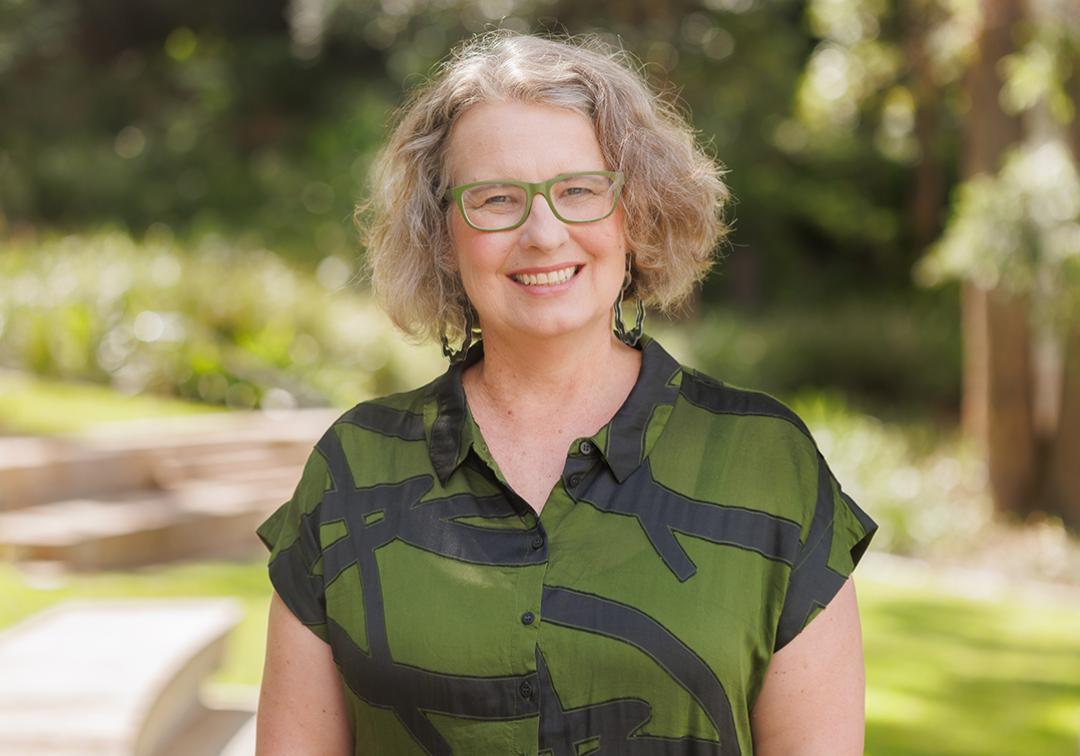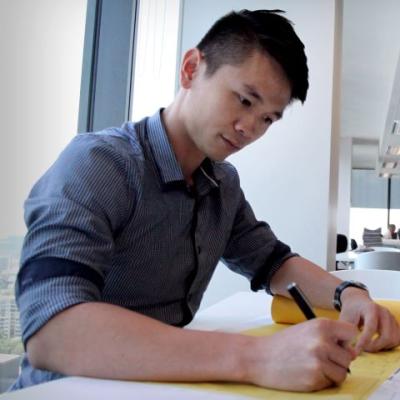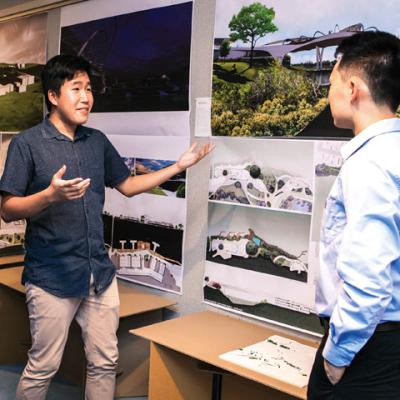
Master of Architecture
Overview
Develop the advanced design, technical and professional skills relevant to the practice of architecture and advancing originality and creativity in the field.
The Master of Architecture is the second stage required to obtain a professional qualification in architecture, and builds on your core skills developed as an undergraduate.
Through your masters study at UQ you'll gain a greater understanding of why architecture is such a dynamic and demanding profession, making a positive contribution to the shaping of our built environment and our culture.
You'll also hone the essential skills of an architect, and your abilities to design buildings and spaces with an inherent concern for human living and society.
You can choose from a range of courses that will develop your ideas about contemporary architectural practice. You'll challenge your thinking through topics such as housing and density, civic buildings and public space, and commercial architecture.
Throughout the program you'll learn from professional architects and leading researchers who have strong local industry links and work to advance the discipline of architecture internationally.
Program highlights
- Study at UQ's School of Architecture, a national leader in architectural education and research that's renowned for pushing the envelope of innovation.
- Engage in a well established program fully accredited by all Australian state and territory architect registration boards who are recognised around the world.
- Prepare for a dynamic profession where you'll provide design solutions for the many questions facing our growing cities and changing environments.
How you'll learn
Your learning experiences are designed to best suit the learning outcomes of the courses you choose.
- Lectures
- Tutorials
- Overseas study
- Fieldwork
- Studios
What you'll study
At UQ, degrees are called 'programs' and subjects are called 'courses'. Here's a sample of the courses you could study in this program:
- Contemporary Architecture Theory and Practice
- Building Futures: Advanced Structures and Software
- Architectural Practice: Business Management
- Architectural Practice: Project Management
Career possibilities
Postgraduate study can take you anywhere. Here are some of the careers you could be on your way to:
- Industrial sector architect
- Architectural designer
- Project delivery architect
- Practice manager
- Architectural technician
- Associate architect
Graduate salary
Architecture & building (postgraduate)
compared.edu.au
Professional memberships
When you graduate, you may be eligible for memberships with the following professional organisations. Contact the organisation to find out how to become a member.
- Australian Institute of Architects
Program accreditation
The Master of Architecture is accredited by:
- Board Of Architects Of Queensland And The Australian Institute Of Architects
Events
See all eventsStories
See all stories
UQ people
Meet the expert: exploring regional and town planning with Stephanie Wyeth
5-minute read

Uni life
What’s it like to study architecture and urban planning as a postgraduate?
3-minute read
Stories
See all stories
UQ people
Meet the expert: exploring regional and town planning with Stephanie Wyeth
5-minute read

Uni life
What’s it like to study architecture and urban planning as a postgraduate?
3-minute read
Entry requirements
Entry requirements
To be eligible for entry, you'll need:
- a bachelor's degree (or equivalent) in architecture.
- a bachelor's degree (or equivalent) in architecture, plus 6 months full-time post-graduate work experience in an architectural environment (see below).
- a bachelor's degree (or equivalent) in architecture.
- a bachelor's degree (or equivalent) in architecture, plus 6 months full-time post-graduate work experience in an architectural environment (see below).
Relevant work experience
Relevant work experience includes work in: architecture, construction, drawing and architectural design. Work experience might occur outside of standard architectural practice, for example working for a council or government body, or consulting company. This will need to be supported with evidence.
Evidence of relevant work experience should include a letter from your employer (and/or previous employers) clearly stating the following:
- That you work (or worked) within the specified organisation
- The nature of your work, detailing any relevant duties and responsibilities to the entry criteria above
- The length of time you were in your role/s (i.e demonstrating minimum length for entry) and whether this was full-time, part-time, or casual
- Any further bespoke conditions listed by the entry criteria
Letters will typically be expected to be presented on company letterhead and signed by a manager or HR representative. A CV or resume is not a sufficient document on its own, and must be accompanied by a supporting letter as described above.
All applications based on work experience are subject to an individual assessment.
English language requirements
IELTS overall 6.5; reading 6; writing 6; speaking 6; listening 6. For other English Language Proficiency Tests and Scores approved for UQ
TOEFL iBT (including Paper Edition) - Overall 87, listening 19, reading 19, writing 21 and speaking 19.
PTE Academic - Overall Score of 64 and 60 in all sub bands.
BE - A minimum overall grade of 4 plus a minimum grade of C in all macro skills.
CES - Overall 176 and 169 in all sub bands.
OET is not accepted.
There are other ways to meet the English language requirements. For some programs, additional conditions apply.
Student visas
International students who are accepted into full-time study in the Master of Architecture are eligible to apply for an Australian student visa (subclass 500).
There are a number of requirements you must satisfy before a visa is granted, including the Genuine Student (GS) requirement.
Need help meeting the entry requirements?
Additional application information
Fees and Scholarships
Indicative annual fee
Approximate yearly cost of tuition (16 units). Your fees will vary according to your selected courses and study load. Fees are reviewed each year and may increase.
$9,540
2026
Approximate yearly cost of full-time tuition (16 units). Your fees will vary according to your study load. Fees are reviewed each year and may increase.
AUD $50,032
2026
Additional costs
- There may be additional course costs associated with travel or materials.
- Books, technical notes etc (approx $150)
- Consumables, paper, pens etc (approx $100-200)
Government assistance
Financial aid
As an international student, you might be eligible for financial aid – either from your home country, or from the Australian Government.
HECS-HELP
Domestic places in the Master of Architecture are Commonwealth supported, as long as you meet all Commonwealth supported place eligibility requirements.
This means the cost of your education is shared between you and the Australian Government. Instead of tuition fees, Commonwealth supported students pay what are called student contribution amounts.
If you have a Commonwealth supported place, you may also be eligible for HECS-HELP. This is an Australian Government loan scheme to assist eligible students with the cost of their student contribution amounts.
Centrelink support
The Australian Government has approved this master's program for income support payments to be made to eligible students.
Scholarships
You may be eligible for more than 100 scholarships, including:
How to apply
Applying online
All international applications should be submitted to UQ. If you prefer, you can use an approved UQ agent near you.
The program code for the Master of Architecture is 5429.
Applying online
All domestic applications should be submitted to UQ.
The program code for the Master of Architecture is 5429.
Important dates
The closing date for this program is:
- To commence study in semester 2 - May 31 of the year of commencement.
- To commence study in semester 1 - November 30 of the previous year.
Visa processing times vary. Apply and accept your offer as early as you can.
To learn more about UQ dates, including semester start dates, view the Academic Calendar.
Important dates
The closing date for this program is:
- To commence study in Semester 2 - June 30 of the year of commencement.
- To commence study in semester 1 - November 30 of the previous year.
To learn more about UQ dates, including semester start dates, view the Academic Calendar.
Aboriginal and Torres Strait Islander applicants
For support with applying – or if you have any questions about university life – get in touch with our Aboriginal and Torres Strait Islander Studies (ATSIS) Unit.
Explore other programs
Express yourself. And your interest.
They say choosing a degree is hard, which is why we've made it easy. Register your interest and we'll send you everything you need to know about applying to UQ.








